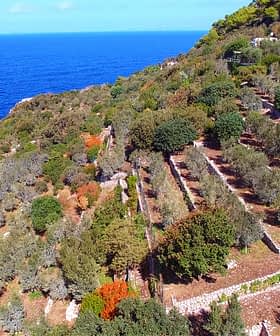Spanish and Italian Producers Share Successes, Challenges at Duel Summits
Olive oil producers and experts gathered for dueling meetings in Sevilla and Rome to examine the challenges of the rapidly changing global olive oil market.
Olive oil producers and experts gathered for dueling meetings in Sevilla and Rome last month.
In Seville, a panel of five experts concluded that Spanish olive groves are doing well, but warned against complacency.
The recovery of domestic consumption can only be achieved through promotional campaigns that emphasize the healthy characteristics of olive oil for the human body.
The group included Silvia Capdevilla the deputy director general of the Ministry of Agriculture; Pablo Lería, head of the Food Department of Extenda; Álvaro Olavarría, managing director of Oleoestepa; Victorino Vega, technical adviser of the IFAPA Alameda del Obispo de Córdoba; and Manuel Cera, the commercial director of Todolivo.
“The Spanish olive grove is in good health,” the panel concluded. “Although the sector should take advantage of the current boom period to consolidate its position and work harder toward overcoming its challenges.”
The experts touted the quality of their olive oil, the region’s commitment to innovation, its environmentally friendly programs and competitive nature. However, they also warned against emerging competition in the export market and urged producers to be proactive in the fight against Xylella fastidiosa.
Meanwhile, members of the Italian Association of the Olive Oil Industry (Assitol) gathered to discuss a much needed revitalization of the nation’s olive oil industry. Assitol members fretted over declining domestic consumption, decreased production and increased competition from around the globe.
Assitol president, Angelo Cremonini, said that overall quality remained as high as ever, but the nation’s historic olive oil culture was waning.
“Although still central to our tables, olive oil has experienced the crisis of consumption and it continues to do so,” Cremonini said. “Olive oil is indeed a globalized product, but also trivialized in its daily use, treated as a common condiment.”
According to the International Olive Council (IOC), olive oil consumption in Italy decreased by 14 percent in the 2016/17 crop year. Only Greece and France experienced larger drops in consumption.
Similar sentiments were echoed in at the meeting in Sevilla. Álvaro Olavarría, the managing director of Oleoestepa — a cooperative of extra virgin olive oil producers — warned that the trivialization of Spanish olive oil was responsible for domestic decreases in consumption.
Spain experienced a seven percent decrease in olive oil consumption during the last crop year. The IOC predicts olive oil consumption will rebound in the coming crop year, but to a lesser degree than last year’s drops.
Eduardo Martín, the secretary general of the Seville Agricultural Association of Young Farmers (ASAJA), said olive oil has been a fat accepted for many years by Spanish consumers. He believes the key to increasing consumption is through better marketing.
“The recovery of domestic consumption can only be achieved through promotional campaigns that emphasize the healthy characteristics of olive oil for the human body,” Martín said.
Pablo Lería, the head of the food department of Extenda, an Andalusian trade promotion agency, said that despite decreased consumption, overall quality was as high as ever among Spanish extra virgin olive oil.
“Extra virgin olive oil is the type that makes up the majority of Spanish exports and is how the industry is presented outside our borders,” he said. “Seven of the ten best extra virgin olive oils in the world today are Spanish.”
Spanish producers earned 109 awards at the 2017 NYIOOC World Olive Oil Competition.
However, Lería did not hide his concern of Spain’s noticeable decrease in olive oil exports to rival, Italy. Spain currently exports 30 percent of its olive oil to Italy. Ten years ago, this figure was 40 percent and demand for the quintessential Spanish commodity continues to decrease.
Back in Rome, Cremonini also warned Italian producers about the olive oil export market. He said that new competition from abroad threatened traditional trade relationships. Countries such as Argentina, Australia, Morocco, Tunisia, Turkey and the United States have become emerging olive oil exporters.
“We are risking relegation. The market today witnesses the advance of new players,” he said. “For years, we preferred to look at (the traditional olive oil exporters rather than the emerging ones) and decide together what opportunities of the market were there to be exploited. Now, we must make up for lost time.”
Despite these stark warnings, Cremonini said that Italy remains well placed in the world olive oil market because of its quality products.
“We have to work on quality oil,” Cremonini said. “Where quality must finally be understood as a good product, rich in hints and flavor and, at the same time, profitable for the entire supply chain”.
According to figures from Assitol, Italy’s olive oil industry made $3 billion last year and its oils have the highest IGP and DOP certifications in Europe. These two certifications are good indicators of quality awarded by the European Union (EU) to verify that the olive oil was made exactly where and how the label indicates it was.
Italian producers were awarded more awards than those of any other country at the 2017 NYIOOC World Olive Oil Competition.
“The markets around the world are demanding a quality product,” David Granieri, president of the Italian Olive Oil Interprofessional Organization, said. “While competition from other countries is growing and is increasingly competitive thanks to commercial practices that, at times, encroach on illegality.”
Granieri said that aggressive commercial behavior, trade restrictions and fake news are used by “new” olive oil producers to promote their brands on the world market.
A trade spokesperson from the European Commision (EC) said she was unaware of any illegal trade practices going on regarding olive oil within the EU.
Granieri said that none of these problems for the Italian sector are likely to go away any time soon and that the way forward is emphasizing Italian brands as well as working with the European Commission to ensure there is a level playing field for all producers.
“Recognizability, distinctiveness, biodiversity all characterize the Italian offer on the world market and are declined according to the continuous evolution of a sector that requires adequate structures and legislation to move with the times,” Granierei said. “It is also important to inform consumers about the nutritional qualities of the product, often not correctly perceived.”
Back in Spain, Martín called on the EC and all olive oil producing nations to work together and abide by the rules set by the IOC.
“It is essential that all olive oil producing countries play with the same rules of the IOC, and to achieve this, an effort by the European Commission itself is essential to intensify contacts,” he said.
“And convince the rest of the countries outside of the EU about the necessity of having a homogenous and objective norm for all processes and characteristics of olive oils, worldwide.”








